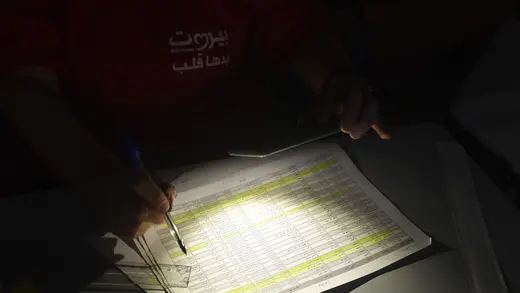What Lebanon’s Election Results Mean for Ending Its Crisis
Hezbollah and its allies suffered serious losses in May’s parliamentary elections, and a divided Parliament will likely struggle to agree on a path out of Lebanon’s current crisis.
By experts and staff
- Published
By
- Kali RobinsonSenior Writer/Copy Editor, Middle East
Do Lebanon’s parliamentary elections signal a change for the much-criticized government?
The May 15 elections brought modest but potentially meaningful shifts in Lebanon’s political establishment. The bloc led by Hezbollah—a Shiite Muslim, Iran-backed militant group and political party—lost its majority. Meanwhile, independents won 13 of Parliament’s 128 seats, up from just one in the 2018 elections. That’s a major achievement in a sectarian electoral system that Lebanon’s power holders designed to work in their favor, says the Middle East Institute’s Randa Slim.
The U.S.- and Saudi-backed Lebanese Forces party surpassed the Hezbollah-aligned Free Patriotic Movement to become the largest Christian party in Parliament. The confessional system implemented after Lebanon’s 1975–1990 civil war divides seats in Parliament among the country’s primary religious groups and earmarks top positions for three of them: the speaker of Parliament must be a Shiite Muslim, the prime minister a Sunni Muslim, and the president a Maronite Christian.
Selecting the speaker will be the first test for Parliament, as the Lebanese Forces and Hezbollah are both powerful establishment parties but “do not see eye to eye on anything,” Slim says. No bloc has a majority, but if the divided opposition and Hezbollah’s bloc can quickly agree on a speaker, that would indicate that the government might be able to come together on other matters, such as passing reforms required for Lebanon to receive badly needed support from the International Monetary Fund (IMF). Still, analysts warn that political deadlock could stall the formation of a government, and thus put off negotiations with the IMF until next year.
What’s at stake?

Lebanon is suffering what the World Bank has described as a “deliberate depression” orchestrated by a few elite families who hoard political power and resources. The Lebanese lira has lost over 90 percent of its value since 2019, and nearly half of Lebanese households struggled to access food and other basic goods last year, according to the World Bank and World Food Program. The public sector is rife with bribery and nepotism, and public services are virtually nonexistent. Essential goods such as medicine are in short supply, and blackouts are so commonplace that some voters cast their ballots for these elections in the dark.
Analysts also blame government negligence for the 2020 Beirut port explosion, which killed more than two hundred people because successive governments failed to heed warnings about improperly stored combustible chemicals. A government-commissioned investigation of the incident has stalled amid resistance from members of Hezbollah and the Shiite party Amal Movement in particular. Some Lebanese are tentatively hopeful that the new government will move the probe forward, even though two lawmakers charged over alleged involvement in the disaster have been reelected.
The overlapping crises have led to fears of societal collapse and an exodus of Lebanese migrants to nearby countries. Lebanon itself possesses the world’s biggest refugee population per capita, and governments in Europe and elsewhere fear a migration crisis could ensue if Lebanon deteriorates further.
What does this vote mean for Hezbollah’s hold on power?
Hezbollah has long been popular among many in Lebanon for its resistance to Western intervention and its ability to provide services when the state can’t. Though the group remains the undisputed leader of Lebanon’s Shiite community, the election results indicate it can no longer claim that the majority of Lebanon views Hezbollah’s weapons as an integral part of national security, Slim says. This is evident in the level of voter support for the Lebanese Forces, which seeks to disarm Hezbollah. The group commands tens of thousands of active fighters and has been called the world’s most heavily armed nonstate actor.
Additionally, experts say some Sunni voters likely voted for the opposition after former Prime Minister Saad Hariri boycotted the elections and pulled his Future Movement party from consideration. Some observers predict that Hezbollah will struggle to get its pick for the presidency elected when President Michel Aoun’s term ends in October.
The elections also showed that a significant share of Lebanese people oppose the status quo, which benefits Hezbollah. This could interest foreign governments that have scorned the group for its close ties to Iran and its history of terrorist activities, among other reasons. The results, Slim says, could incentivize countries such as the United States, France, and Saudi Arabia to invest in opposition forces. “Unless the international community invests in a long-term strategy to support these agents of change, or this movement for change,” she says, “I don’t think it can sustain itself for the long term.”